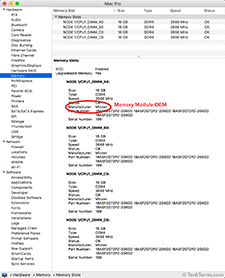OEM
Stands for "Original Equipment Manufacturer."
An OEM is a company that manufactures or develops something that is sold by another company. In the computer world, it can refer to both hardware and software.
Most computers contain components manufactured by multiple companies. For example, Dell does not make all the components in a Dell laptop, and Apple does not make all the components in an iMac. While these companies design the computers, they incorporate components from other manufacturers. For example, a Dell laptop might contain an AMD processor and a Samsung SSD. AMD would be the processor OEM, and Samsung would be the OEM of the storage device. An iMac might contain an Intel processor and Micron RAM. In this case, Intel and Micron are the respective OEMs.
Knowing which OEMs provide components to your computer can be helpful when replacing or upgrading parts. It can help ensure you get as close of a match as possible to the original part. If you have had issues with a certain component, it might make sense to switch to another manufacturer. Just make sure the hardware specifications are supported by your system.
OEM Software
OEM software refers to programs that are bundled with a computer system. This includes applications and utilities that are developed by various software developers and installed on a system before it is sold. It can also refer to an operating system, such as Windows, that is installed on a PC. Users who build their own PCs often purchase an "OEM license" of Windows to install on their custom system.
NOTE: The term OEM is used in many other industries as well. For example, auto manufacturers often include multiple OEM parts in their cars and trucks. For example, an Acura may have NGK spark plugs and Bose speakers, while an Audi might have Bosch spark plugs and Bang & Olufsen speakers.
 Test Your Knowledge
Test Your Knowledge